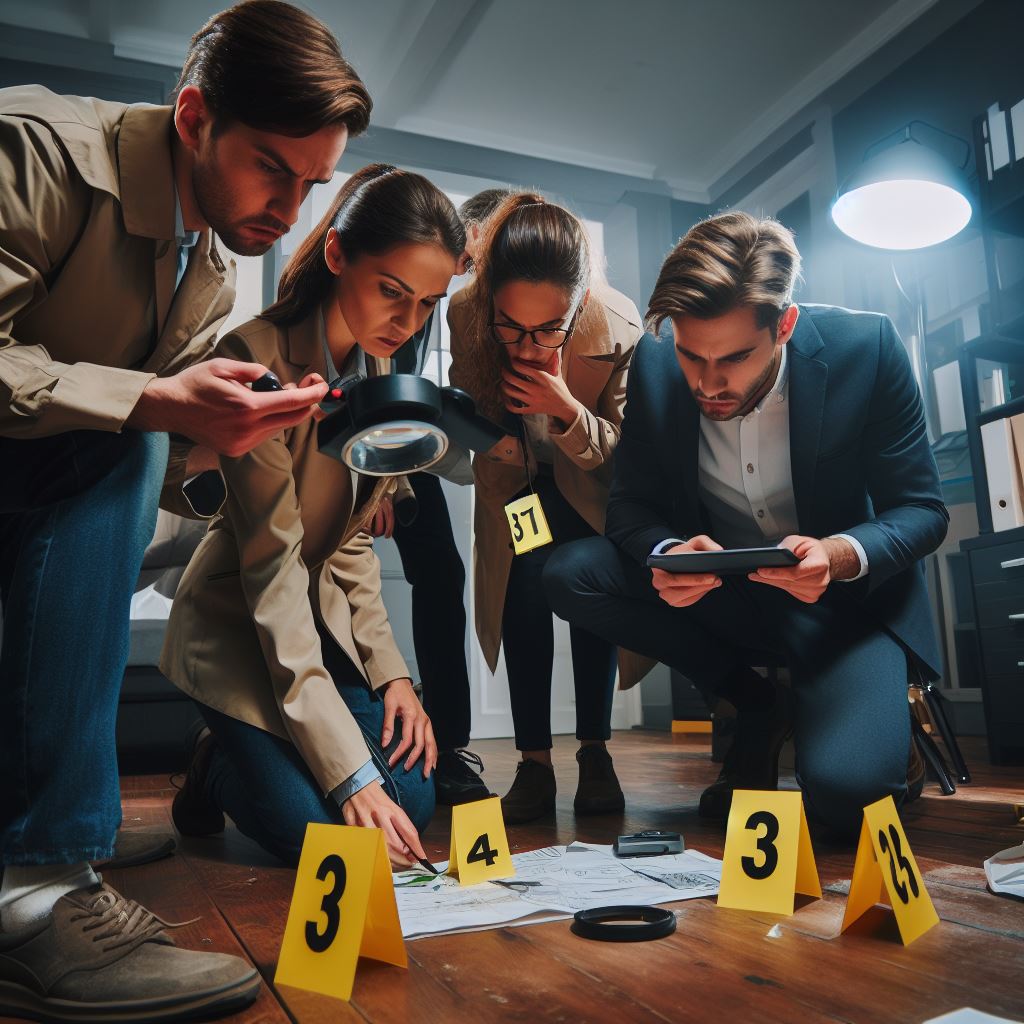Introduction
A. Overview of Skills and Training for Aspiring US Detectives
Mastering skills and training is crucial for those aspiring to become detectives in the US. The demand for detectives is on the rise, making it a compelling career choice.
B. Increasing Demand for Detectives
With the evolving nature of crime, the demand for skilled detectives is higher than ever.
The country relies on these professionals to maintain law and order effectively.
C. Thesis Statement
This section explores the essential skills and training needed to embark on a successful career as a detective in the US.
From analytical prowess to specialized training, we’ll uncover the keys to unlocking this challenging yet rewarding profession.
Read: Military Academies in the USA: Training Future Leaders
Key Skills for Aspiring US Detectives
A. Strong analytical and problem-solving abilities
A strong foundation in analytical and problem-solving abilities is a fundamental requirement for aspiring US detectives.
These skills enable detectives to assess complex situations and evidence, making logical connections and drawing conclusions.
Critical thinking plays a key role in investigative work, as it allows detectives to analyze information objectively and uncover hidden patterns or motives.
In various scenarios, analytical skills are crucial for detectives to effectively solve cases.
For example, when examining crime scenes, detectives must carefully observe details such as the positioning of objects, signs of forced entry, or unusual patterns.
Through analysis, they can reconstruct events and identify key evidence that may lead to crucial breakthroughs in the investigation.
B. Excellent communication and interpersonal skills
Effective communication and interpersonal skills are vital for aspiring US detectives.
Detectives need to collect information from various sources and effectively communicate with witnesses, informants, and colleagues.
Communication skills allow detectives to interview individuals involved in cases and gather accurate and detailed information.
Furthermore, building strong relationships with witnesses, informants, and colleagues helps detectives gain trust and cooperation.
Establishing rapport with individuals involved in investigations can lead to valuable insights and information that may assist in solving cases.
C. Attention to detail and keen observation skills
Attention to detail and keen observation skills are essential for aspiring US detectives.
Detectives must be able to notice and interpret even the smallest details that may be crucial in solving cases.
Observing crime scenes, documentary evidence, or witness testimonies diligently can uncover critical leads or discrepancies.
Transform Your Career Today
Unlock a personalized career strategy that drives real results. Get tailored advice and a roadmap designed just for you.
Start NowDetectives should develop the ability to recognize patterns and inconsistencies in evidence.
By connecting seemingly unrelated information or identifying inconsistencies in testimonies, detectives can reveal information that might have otherwise been overlooked.
D. Adaptability and ability to work under pressure
Adaptability and the ability to work under pressure are crucial traits for aspiring US detectives.
Detective work is unpredictable and often involves handling high-stakes situations that require quick thinking and action.
Detectives must be able to adapt to changing circumstances, such as unexpected developments or new evidence, and adjust their investigative strategies accordingly.
Additionally, they must effectively manage stress and maintain composure during high-pressure situations, ensuring that their decisions and actions are rational and objective.
In Fact, aspiring US detectives must possess a range of key skills to excel in their field.
Strong analytical and problem-solving skills drive success in detective work, demanding excellent communication, keen observation, adaptability, and the ability to work under pressure.
Read: Challenges Faced by Military Families: Relocation & More
Training Programs for Aspiring US Detectives
When it comes to becoming a detective in the United States, aspiring individuals need to undergo rigorous training programs and acquire specific skills to excel in this field.
In this section, we will explore the various training avenues available for those who aspire to become US detectives.
A. Academics and education requirements
To kickstart a career in detective work, it is advisable to pursue an associate or bachelor’s degree in criminal justice or a related field.
These programs provide a solid foundation of knowledge necessary for investigative work.
Additionally, aspiring detectives should consider taking specialized courses that focus on investigative techniques and criminal law.
These courses help develop the specific skills needed to succeed in this field.
B. Law enforcement experience and apprenticeship
Prior experience in law enforcement, such as working as a police officer or in other investigative roles, can greatly benefit individuals aspiring to become detectives.
This experience provides valuable insights into the criminal justice system and enhances their understanding of investigative procedures.
Moreover, apprenticeship programs and on-the-job training offer aspiring detectives the opportunity to learn hands-on investigative methods.
Working alongside experienced investigators allows them to gain practical knowledge and sharpen their skills.
C. Specialized training and certifications
Various professional organizations, such as the FBI National Academy and the International Association of Crime Analysts, offer specialized training programs for aspiring detectives.
These programs provide a comprehensive curriculum that covers advanced investigative techniques and case management.
Transform Your Career Today
Unlock a personalized career strategy that drives real results. Get tailored advice and a roadmap designed just for you.
Start NowObtaining certifications in specialized areas of investigation, such as computer forensics or crime scene analysis, can significantly enhance a detective’s credentials.
These certifications demonstrate expertise in specific investigative fields, offering a competitive advantage during recruitment processes.
In essence, becoming a successful detective in the United States requires a combination of academic qualifications, relevant experience, and specialized training.
Pursue a criminal justice degree, take specialized courses, gain law enforcement experience, and obtain certifications to equip yourself for success in the challenging and rewarding detective profession.
Read: The Role of Chaplains: Spiritual Guidance in the Forces

Practical Experience and Career Development
A. The significance of gaining practical experience in the field
Practical experience is crucial for aspiring US detectives in order to develop their skills and knowledge.
Hands-on experience allows detectives to apply theoretical knowledge to real-life situations.
Practical experience helps detectives gain a deep understanding of investigative procedures and techniques.
By gaining practical experience, aspiring detectives can familiarize themselves with the challenges and demands of the job.
Real-world experience teaches aspiring detectives problem-solving skills and improves their decision-making abilities.
Practical experience also enhances an aspiring detective’s ability to gather and analyze evidence.
B. Opportunities for aspiring detectives to intern or work in law enforcement agencies
Internships provide aspiring detectives with valuable exposure to the inner workings of law enforcement agencies.
Internships allow aspiring detectives to shadow experienced detectives and learn from their expertise.
Working alongside seasoned detectives provides aspiring detectives with mentorship and guidance.
Internships also offer aspiring detectives an opportunity to build a network of contacts within the law enforcement community.
Law enforcement agencies often recruit interns who show exceptional skills and dedication for future detective positions.
Internships can serve as a stepping stone for aspiring detectives to secure full-time employment in law enforcement agencies.
C. The importance of continuous professional development and staying updated with advancements in the field
Ongoing professional development is crucial for aspiring detectives to stay at the forefront of their field.
Continuous learning ensures that detectives are updated with advancements in investigative techniques and technologies.
Attending training programs and workshops allows detectives to acquire new skills and expand their knowledge base.
Transform Your Career Today
Unlock a personalized career strategy that drives real results. Get tailored advice and a roadmap designed just for you.
Start NowProfessional development opportunities offer detectives the chance to network with other professionals in the field.
Staying updated with advancements in the field enables detectives to adapt and respond effectively to evolving crime trends.
Continuous professional development demonstrates an aspiring detective’s commitment to their career and ongoing self-improvement.
Overall, practical experience is essential for aspiring US detectives to develop their skills and gain a deep understanding of the field.
Internships or work experiences in law enforcement agencies can provide valuable exposure, mentorship, and networking opportunities.
Continuous professional development ensures that detectives stay updated with advancements in the field and maintain their effectiveness.
To achieve success as a detective, aspiring professionals should actively seek opportunities for practical experience and ongoing career development.
Read: The U.S. Marine Corps: Elite Force of the Military
Conclusion
A. Key Skills for Aspiring US Detectives
- Sharp Observation: Detectives must keenly observe details, connecting dots that others might miss.
- Analytical Thinking: Analyzing evidence and situations critically is pivotal in solving complex cases.
- Effective Communication: Clear communication aids in collaboration with colleagues and conveying findings to superiors.
B. Importance of Training and Certifications
- Specialized Training: Undertake courses in criminal justice, forensics, and investigative techniques.
- Certifications: Acquire certifications like the Certified Criminal Investigator (CCI) to enhance credibility and expertise.
- Ongoing Learning: Stay updated on evolving investigative methods through continuous professional development.
C. Encouragement for Future Detectives
- Passion Alignment: Choose a detective career path that aligns with your passion and inherent skills.
- Continuous Improvement: Cultivate a mindset of constant learning and improvement for sustained success.
- Seize Opportunities: Actively pursue internships and entry-level positions to gain hands-on experience.
Embark on your detective journey with diligence, continuous learning, and a passion for justice.




